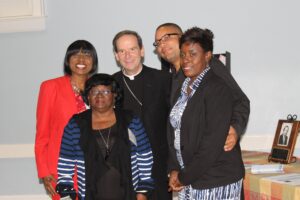Catholic Campaign for Human Development awards more than $1OO,OOO in grants

(Representatives from Durham Economic Resource Center. From left to right: Jackie Brown, Dinah Patterson, Bishop Michael F. Burbidge, Chris Evans, Lisa Evans)
Catholic Charities held its 2014 Community Partners Recognition Dinner on Thursday, October 30 at Saint Michael’s Parish Center in Cary.
Cathy Penny, a member of the Catholic Charities board of directors, welcomed guests, and Fr. Douglas Reed, pastor of Saint Michael, said the opening prayer.
The event included distribution of grants from the Catholic Campaign for Human Development (CCHD.) Two national grant winners, Durham Economic Resource Center and Orange County Justice United, received grants of $50,000 and $35,000, respectively.
Nine organizations received local grants which ranged from $500 – $3,000 each. Those nine recipients are:
- Community Empowerment Fund, Chapel Hill, NC
- Durham Interfaith Hospitality Network, Durham, NC
- Lincoln Heights Community Center, Roanoke Rapids, NC
- Mano Al Hermano, Nags Head, NC
- Partners for Youth Opportunities, Durham, NC
- St. Ann Catholic Church, Clayton, NC
- St. Elizabeth of Hungary Catholic Church, Raeford, NC
- Step Up Ministry- Life Skills, Raleigh, NC
- The Carying Place, Cary, NC
Representatives from each organization were present. In total $108,000 was awarded.
Through CCHD grants, Catholics serve low-income families and communities working to overcome poverty. According to CCHD, 46 million people in the United States are classified by the federal government as living in poverty, a statistic that translates to one out of every seven Americans and one out of every five children.
In her remarks about grant recipients, CCHD advisory board member Ann Grossman spoke about the legitimate right of each person to live and work.
“Last September while visiting a Jesuit refugee home, Pope Francis said, ‘Accompanying on its own is not enough. It is not enough to offer someone a sandwich unless it is accompanied by the possibility of learning how to stand on one’s own two feet,’” she said. “’Charity that leaves the poor person as he is, is not sufficient. True mercy, the mercy God gives to us and teaches us, demands justice; it demands that the poor find the way to be poor no longer.’”
